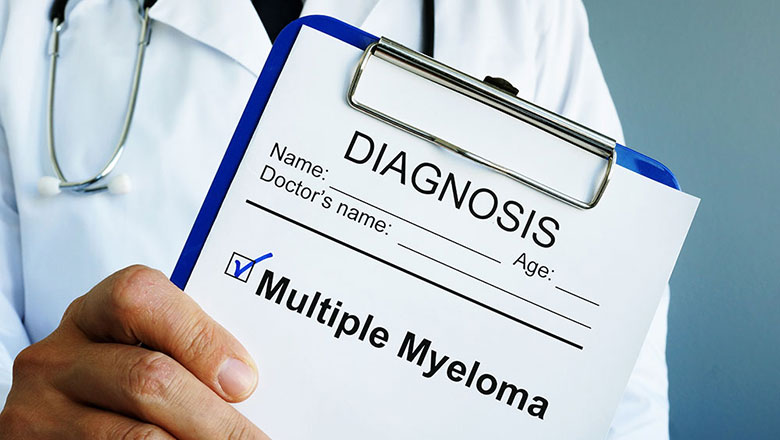About Multiple Myeloma
Myeloma begins when a plasma cell becomes abnormal. The abnormal cell divides to make copies of itself. The new cells divide again and again, making more and more abnormal cells. These abnormal plasma cells are called myeloma cells.
In time, myeloma cells collect in the bone marrow. They may damage the solid part of the bone. When myeloma cells collect in several of your bones, the disease is called “multiple myeloma.” This disease may also harm other tissues and organs, such as the kidneys.
Myeloma cells make antibodies called M proteins and other proteins. These proteins can collect in the blood, urine, and organs.
Risk Factors & Symptoms of Multiple Myeloma

The causes of multiple myeloma are not known, and some people experience symptoms while others do not. Because of this, it is important to know what to look for and what could increase your risk to help catch multiple myeloma as early as possible, which makes it easier to treat.
Multiple Myeloma Diagnosis

Doctors sometimes find multiple myeloma after a routine blood test. More often, doctors suspect multiple myeloma after an x-ray for a broken bone. Usually, though, patients go to the doctor because they are having other symptoms.
Your doctor also may order some of the following tests:
- Blood tests
- Urine tests
- X-rays
- Biopsy
Staging Multiple Myeloma

If a biopsy shows that you have multiple myeloma, your doctor needs to learn the extent (stage) of the disease to plan the best treatment.
Doctors may describe multiple myeloma as:
- Smoldering
- Stage I
- Stage II
- Stage III
Multiple Myeloma Treatment Options

Patients who have been diagnosed with multiple myeloma have many treatment options. Multiple Myeloma treatment options include:
- Watchful waiting
- Induction therapy
- Stem cell transplant
Sometimes a combination of these treatment methods are used.
Support Services for Multiple Myeloma Patients

We understand you may be feeling overwhelmed with questions and concerns about your type of leukemia and all that it means. From second opinions to our patients benefit representatives and oncology social workers, the support specialists at Compass Oncology are here to help you during every step of your cancer journey.
In addition to looking through our survivorship resources, we also encourage you to take advantage of both our Compass Oncology cancer support groups and other local cancer support groups in and around Portland, OR, and Vancouver, WA.



